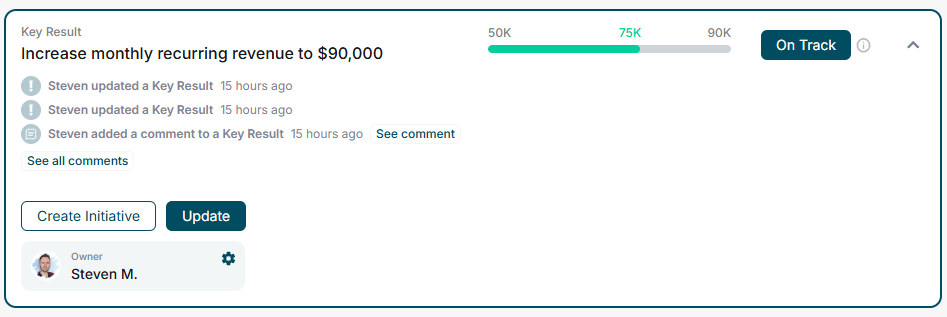Few topics in the OKR world spark more debate than this:
Should you set OKRs at the individual level?
Some argue they create clarity and accountability. Others say they kill collaboration, reduce OKRs to task lists, and pile stress onto people who already feel stretched thin.
I’ve seen both sides up close. Over the last several years, I’ve helped startups scale their OKR programs, and more than 500 teams have run OKRs inside OKRs Tool. Across all that experience, one truth stands out: individual OKRs are easy to start, but hard to sustain.
Let’s unpack both sides of the debate - and look at better alternatives that protect focus and engagement without drowning your company in goal clutter.
The Case For Individual OKRs
On paper, individual OKRs make perfect sense. They bring goals down to the ground level where work actually happens. In some situations, they can be genuinely helpful:
Clarity at the edge
In startups, priorities shift constantly. Individual OKRs give people a compass. For example: a customer success manager might set “Improve net retention” as an objective with KRs like “Increase renewal rate from 85% → 92%.” That clarity keeps them focused even when the company is juggling ten fires.
Sharper accountability
Shared ownership is a common failure mode in OKRs. If a key result belongs to “the product team,” no one feels personally responsible. With individual OKRs, accountability is explicit. You know exactly who’s on the hook for moving a metric.
Professional development
Some leaders use individual OKRs as a growth tool. They show how someone’s role connects to business outcomes, which can increase motivation. A junior marketer with an OKR tied to qualified leads isn’t just “writing blog posts” - they see the bigger impact of their work.
Better performance conversations
When used carefully, individual OKRs can support feedback. They give managers a framework: “Here’s what we agreed mattered this quarter - let’s reflect on progress.”
In short: when teams are small, well-aligned, and disciplined, individual OKRs can sharpen focus and ownership.
The Case Against Individual OKRs
But here’s the reality: in the majority of startups I’ve worked with, individual OKRs have done more harm than good. Why?
Fragmentation and silos
When every person has their own OKRs, the company ends up with dozens of goals. Alignment breaks down. Instead of pulling toward a shared outcome, everyone optimizes for their own slice. One founder told me: “It felt like we had 30 mini-companies inside one startup.”
Micromanagement risk
Individual OKRs often drift into task lists: “Ship feature X,” “Write three blog posts,” “Run five sales calls.” That kills the spirit of OKRs, which is about outcomes and impact. Worse, it makes employees feel like they’re being managed by checklist.
Process overload
Company OKRs + team OKRs + individual OKRs = a mountain of admin. Leaders spend more time updating dashboards than executing. In one 40-person company, they ended up with over 120 key results. By week four, updates had collapsed.
Morale issues
The fastest way to kill ambition is to tie OKRs too tightly to performance reviews. If every individual KR affects someone’s appraisal, people start sandbagging - choosing easy goals they know they can hit. You lose stretch, innovation, and honesty.
The result is predictable: after a quarter or two, teams abandon individual OKRs, declaring “OKRs don’t work here.” But it’s not the framework that failed - it’s the unnecessary extra layer.
Alternatives to Individual OKRs
So what should founders do instead? Over the years, I’ve seen three models work consistently better than individual OKRs:
1. Company + Team OKRs Only
Keep OKRs at the company and team level.
Assign individuals as owners of specific key results within those team OKRs.
Example: The Growth team owns “Improve trial → paid conversion,” but a single PMM owns the KR on “Increase activation email CTR from 12% → 18%.”
This keeps accountability clear without multiplying OKRs.
2. Personal Priorities, Not Personal OKRs
Encourage individuals to set 2–3 personal priorities each quarter, but don’t formalize them as OKRs.
Example: a designer’s priorities might be “lead redesign of onboarding flow” and “mentor new junior hire.”
This gives people focus without adding another layer of formal goals to track.
3. Shared OKRs + Clear Ownership
For every team OKR, assign one clear owner per KR.
Example: Engineering owns “Reduce API error rate to <0.2%,” but a single lead dev is named as responsible for reporting progress.
This balances collaboration (shared objectives) with accountability (owned results).
Each of these approaches delivers the upside of focus and ownership - without drowning the company in goal clutter.

My Take
After a lot of trial and error, here’s my blunt assessment: individual OKRs are rarely worth it for startups under 50 people.
Why? Because early-stage companies live and die on collaboration, not personal scorecards. Startups need energy moving together - not splintered into 30 personal dashboards.
That doesn’t mean there are no exceptions:
- Sales teams. In quota-driven functions, individual OKRs can work because metrics are inherently personal.
- Large organizations. Once you’re 200+ people, the culture and structure can support it - though even then, it’s a choice, not a necessity.
But for most founders, the smartest play is this: company OKRs set direction, team OKRs drive execution, and individuals take ownership of key results inside those team goals. That’s enough accountability without the chaos.
Individual OKRs vs. the Alternatives
Sometimes it helps to see the tradeoffs side by side. Here’s how individual OKRs compare to the alternatives most founders end up using.
The takeaway is clear: most startups are better off skipping individual OKRs and doubling down on team-level goals with clear ownership. That gives you focus and accountability - without burying the company in extra processes.
Final Thoughts
The debate over individual OKRs will never die, because on paper, they look like the perfect solution to accountability. But most startups don’t fail because of a lack of personal scorecards - they fail because of lost focus and low engagement.
So here’s the question to ask yourself: will individual OKRs simplify or complicate our focus?
If the answer is “complicate,” skip them. Protect the team’s energy for what really matters: building, learning, and scaling.
The strongest teams I’ve worked with don’t obsess over individual OKRs. They obsess over making company and team OKRs visible, alive, and owned. That’s how you get alignment without the overhead - and how OKRs stop being theory and start becoming the operating system of your startup.






